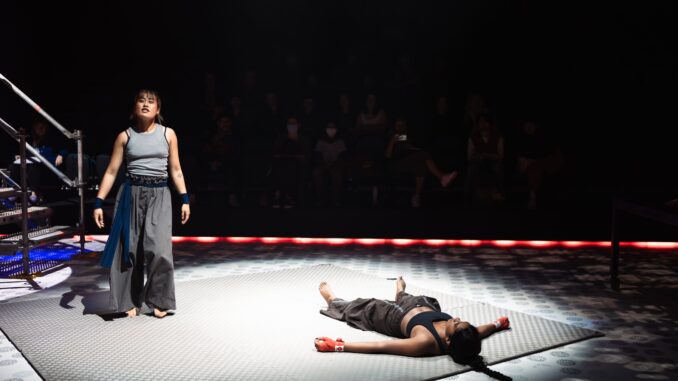
This year’s commentary is split into two parts. CLICK HERE for 2023 – A Theatrical Year in Review [Part 1 – The Issues].
Theatre Scenes’ recent annual Year in Reviews have focussed on big sector issues, broadening our focus beyond the theatre performed on our stages. But it is always a relief to turn the attention back to the shows, and revisit what our team of reviewers made of them.
So, let’s get back to business.
Well, not quite yet. Silo Theatre made the big call that “2023 = cancelled”, meaning we missed out on Silo’s usual agenda-setting productions this year. The company instead developed work internally, sneaking in a live live cinema production of Night of the Living Dead as their one and only public show of the year. Erin O’Flaherty found it to be “a fun and innovative concept that unites the mediums of cinema and theatre; it playfully exists in both and neither. It is full of delicious contradictions – like the zombies themselves, caught between life and death.”
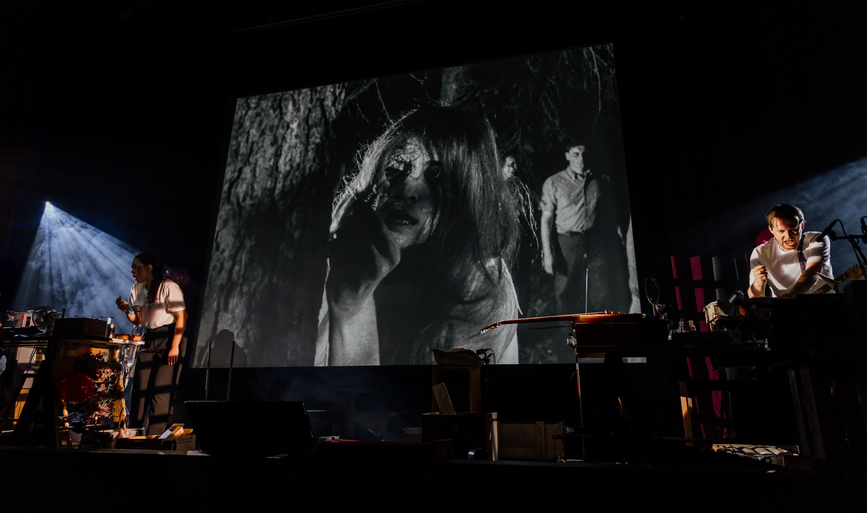
Another production playing between these artforms was The Picture of Dorian Gray, direct from Sydney Theatre Company and presented by Auckland Arts Festival. While the production had many in the arts community buzzing, our reviewer Tim George wasn’t so sold:
I felt like there was not enough left for the audience’s own imagination. There is so much use of screens, and footage of characters acting in other environments, that it starts to feel overwrought, and starts to impede the impact of [Eryn Jean] Norvill’s performance.
Auckland Pride
Theatres Scenes joined The Pantograph Punch, Bad Apple Gay, and Rat World for the Auckland Pride Review Project, aiming to provide more critical discourse around queer theatre and performance work. Our reviewers covered a rainbow of shows hosted by Auckland Pride: Show Ponies, Naked & Dangerous, Concerning the UFO Sighting Outside Mt Roskill, Auckland, Festival of Live Art, F.O.L.A, The Best is Yet to Come: A Queer Magic Show, Jez & Jace: Lads on Tour, Man Lessons, Access and She’s Crowning: Rebirth.
Auckland Theatre Company
King Lear was the centrepiece of Auckland Theatre Company’s programme, ATC’s first Shakespeare production over a decade. Many had long anticipated the prospect of Michael Hurst being ready to play the ageing King. Unfortunately, flawed staging choices contributed to the production missing the full power of the play. Following earlier Covid cancellations, both Witi’s Wāhine by Nancy Brunning and Things that Matter by Gary Henderson finally made it to the ATC stage. Things that Matter’s “sobering account of the alarming state of our healthcare system” taking on new urgency in an election year.
Ankita Singh’s debut play, Basmati Bitch, was one of the most exciting nights I had at the theatre this year. Erin O’Flahery described it as “a visually spectacular, fast-paced firecracker of a show. Think Blade Runner meets Scott Pilgrim… It is rare that we get to see locally-produced work of this ambition and aesthetic flare on our stages… I laughed and I yelled, and my heart soared. Blazingly modern and joyously thrilling, you will be sorry to miss it.”
Wellington Ballroom
Another standout for me this year was Arawhata, by Wellington Ballroom, which played in Wellington, Auckland and Hawkes Bay. Following in the footsteps of queer forebears, it was a smashingly confident debut centering the stories of takatāpui and trans indigenous people of colour.
Hamilton
Lin-Manuel Miranda’s Hamilton arrived at Spark Arena, the first-ever Arena version of the blockbuster musical. Unfortunately sound and sight-line issues significantly marred the experience, with a reliance on the big screens bookending the stage. You might have been better off staying home and watching the Disney Plus version, if not for the standout New Zealand performers in the Australasian cast, Akina Edmonds and Matu Ngaropo. Ngaropo’s incorporation of Māoritanga into his performance of George Washington (including hongi and haka) stopped the show on closing night, the audience erupting with proud applause.
Theatre for Legal Change
Two different New Zealand productions of Prima Facie by Australian playwright Suzie Miller played in Auckland and Wellington at the same time this year. A clear-eyed cross-examination of the flaws in how the legal system deals with sexual assault cases, Prima Facie is a play that has been changing legal practice: Northern Ireland Judges are required to watch the play before taking the bench. Law professionals attending the Wellington season (starring Mel Dodge) and post-show Q&A could claim two continuing professional development points. As the production’ director Lyndee-Jane Rutherford noted in the programme, “artists… who often struggle to make a living wage, will be educating our lawmakers and those who uphold the law.”
Sharu Delilkan and Tim Booth reviewed the Auckland season season (starring Acushla-Tara Kupe):
Miller’s intense and insightful script is an actor’s dream and Kupe devours every word and delivers them with great aplomb. She grabs the audience’s attention from the first moment and doesn’t let go, while some well-timed comedic moments provide a much needed reprieve from the weighty subject matter….After the show you leave with the feeling that it is us, the audience, that have been cross-examined in the witness box. We left feeling exhausted but educated and enriched. Prima Facie is raw, with harrowing moments where “No means no” appears to be ‘open to interpretation’ or at times just simply dismissed, and asks whether the law as it stands can actually provide justice in its current guise.
New Work
There was an abundance of new work from a number of our established theatre companies: Moe Miti by Katrina George from Red Leap Theatre, Dirty Work by Justin Lewis and Jacob Rajan from Indian Ink Theatre Company, I Want to Be Happy by Carl Bland from Nightsong, Heart Go…Boom! from Massive, and Not Woman Enough by Hweiling Ow and How to Throw a Chinese Funeral by Jill Kwan from Proudly Asian Theatre. The latter play had Sharu Delilkan and Tim Booth rejoicing “Alamak!”:
It’s such a treat to hear authentic Manglish at The Basement Theatre. For the uninitiated, Manglish is the ‘rojak’ (fruit salad) combination of English-Malay-Cantonese-Hokkien-Hindi-Tamil words that typically pepper everyday Malaysian conversations. And How to Throw a Chinese Funeral’s dialogue epitomises this Malaysian vernacular down to its core. The play captures a familiar slice of Malaysian life featuring over the top caricatures of the disapproving martyr-like parent and auntie who are juxtaposed against their Western-wannabe offspring.
Eleanor Bishop and Karin McCracken invited us to check into Heartbreak Hotel. Hannah Jamieson advised us to “prepare to laugh, cry, and be thoroughly entertained at the Heartbreak Hotel; its music-comedy concoction is the perfect remedy for a broken heart.”
Nathan Joe had a new play – sort of. First developed in 2013, Joe’s Groundhog Day inspired play Losing Face finally made its debut, following Joe’s triumphant Scenes From a Yellow Peril last year. Irene Corbett wrote: “Losing Face grapples with the everything bagel that is the human heart and succeeds. It is very Christmassy, very gay, and very much about family – equal parts joyous, frightening, loving, and exposing. Losing Face is a great New Zealand play.”
Punctum Productions followed up Losing Face with Chick Habit by Nuanzhi Zheng at Basement Theatre. Jess Karamjeet found Chick Habit was “an uplifting show about queer, Asian women in a punk band – and that alone in our current climate is pretty revolutionary. What more could Tāmaki Makaurau ask for right now?”
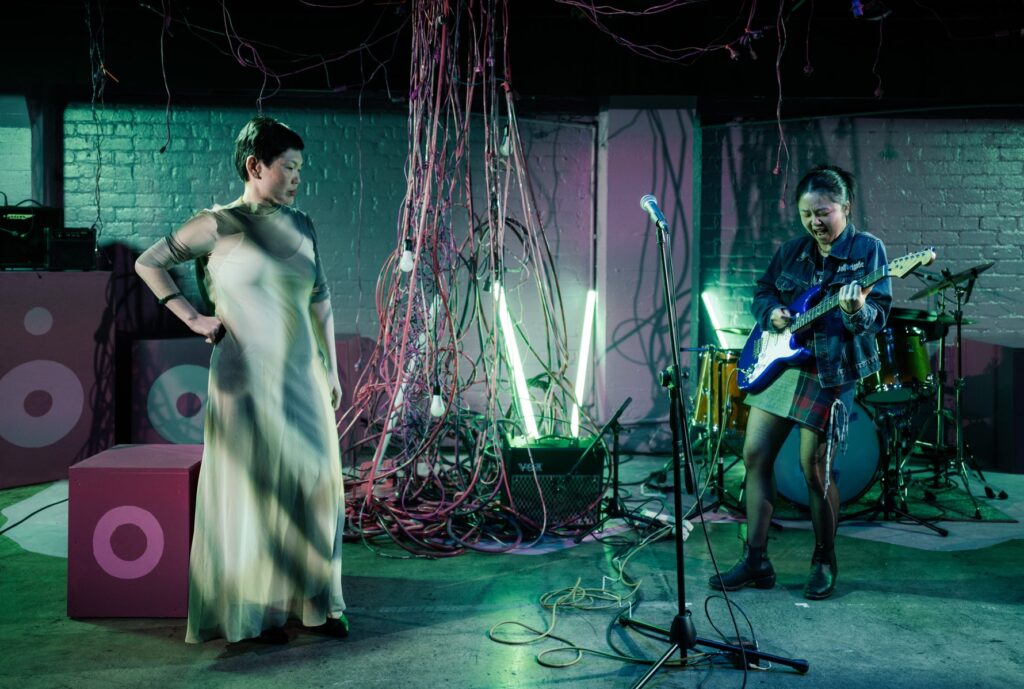
Other shows at Basement Theatre included Penny Ashton’s Shakespeare parody The Tempestuous, Henchman, Club Waack, Chairs! and this year’s Christmas show, Jingle Bellethon Telethon.
One of the most enterprising debuts of new work came from Barden Party’s Butterfly Smokescreen. I reported from Auckland’s Viaduct Harbour:
The world’s only immersive theatre experience aboard a superyacht? That’s the bold claim made in the ads for Butterfly Smokescreen, and I don’t have any reason to doubt it. The notion of creatives getting the opportunity to make an immersive, murder-mystery theatre show taking place on an actual multi-million-dollar yacht in Aotearoa seems like a pipe dream, and yet, for the past two months, audience members dressed to the nines in 1920s fashion have been turning up to Auckland’s viaduct harbour for a truly memorable performance experience… But this was no joke for the patron, who was willing to stump up some cash. They secured the Sea Breeze III, which usually charters for $100K per week. Barely one month later, they were opening the show.
The biggest surprise? “The terrifyingly rapid turn-around from pitch to production has resulted in a remarkably cohesive experience.”
New Spaces
Some great news: Mt Roskill’s Number Three Theatre, led by young Pasfika theatremakers, secured a permanent theatre on Dominion Road. “It means somebody’s a step closer to their dream, having this resource here” Lijah Mavaega told 1News, “It could be someone just needs a space to dance, or have room to sing their lungs out, or get an idea out and put in on a piece of paper to share it.”
“Nelson’s brand-new home of storytelling”, The Professional Theatre Company launched this year, opening with the Shakespearean inspired Mr & Mrs Macbeth of Dodson Valley Road by Gregory Copper
Te Pou Theatre opened its new whare at Corban Arts Estate in January. Our reviewers enjoyed Te Pou’s shows Ngā Reta, Limited Time Only, Concerning the UFO Sighting Outside Mt Roskill, Auckland. Te Pou was a fitting host for the return season of The Haka Party Incident by Katie Wolfe (which debuted with Auckland Theatre Company in 2021, a standout production that year) as it prepared to embark on its first national tour.
Anuja Mitra, who reviewed the 2021 production, and Morgan Dalton-Mill (Ngāti Whātua ki Kaipara) had a kōrero about what it meant to experience the work at Te Pou’s Tokomanawa theatre:
A: When I first saw the show, it was on the sprawling stage of the ASB Waterfront Theatre. You mentioned that the theatre at Te Pou has the dimensions of a wharenui. There was a general atmosphere of welcoming everyone into that space, allowing them to choose and settle into their seats before the play began about 10 minutes after the scheduled start time. How did the stage, and physical space more broadly, impact your experience of the show?
M: The Tokomanawa theatre has a high ceiling, with two ceiling panels that meet where the pou tokomanawa in a wharenui would be, and a huge amount of bare floor space. So stepping into the space immediately made me feel as though I was in a wharenui like those I’ve been to and stayed in. I thought this was appropriate because the wharenui is where important kaupapa is discussed, such as the kaupapa at the centre of this play.
They also discussed the play’s purposeful and powerful use of kapa haka:
A: We can’t talk about the show without talking about the kapa haka! The kaiako kapa haka/kaitito haka was Nīkau Balme, who composed one of the haka performed. There was some great comedy flowing from the engineering students’ butchering of the haka, but the one on my mind is definitely the final haka composed by Nīkau, He Taua. It was powerful, too, to see some audience members perform a haka in response.
M: That haka was a standout. Seeing it filled me with awe and pride. I’m no expert in kapa haka or te ao Māori broadly, but I thought He Taua was a wonderful example of a haka with kaha, ihi and wehi. It was at full volume and the singing was out of this world. I enjoyed watching the taiaha used correctly during this haka compared to the other parody haka by the engineering students. I was also thrilled to see Nī lead parts of this haka. It was a moving way to finish a moving play — I was in tears for so many reasons afterwards.
Embarking on a national tour following a tough string of Covid cancellations over several years, The Haka Party Incident demonstrated again this year the power of art to shine a light on hard conversations, a beacon promoting understanding and connection between Māori and tauiwi during a particularly corrosive election campaign. At the Wellington Theatre Awards in December, The Haka Party Incident was awarded Production of the Year.
Finally, a big thank you to Irene Corbett, who stepped up this year as Auckland editor, organising, editing and posting reviews. Irene has helped keep Theatre Scenes going for another year (did you know we’ve been at this since 2010?!). A special welcome to new reviewers Hannah Jamieson and Jackshen Lee, and thank you to everyone who contributed to Theatre Scenes this year. We made it!
SEE ALSO:
Theatre Scenes Theatrical Year in Reviews: 2022; 2021; 2020; 2019 ; 2018 ; 2017 ; 2016 ; 2015 ; 2014 ; 2013 ; 2012 ; 2011 ; 2010

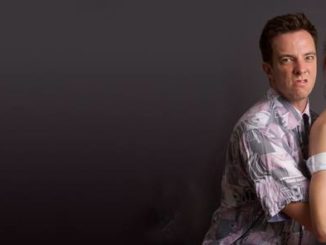

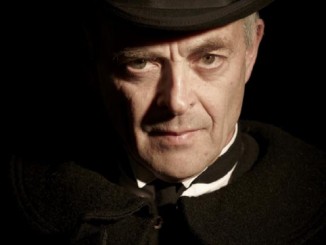
Leave a Reply